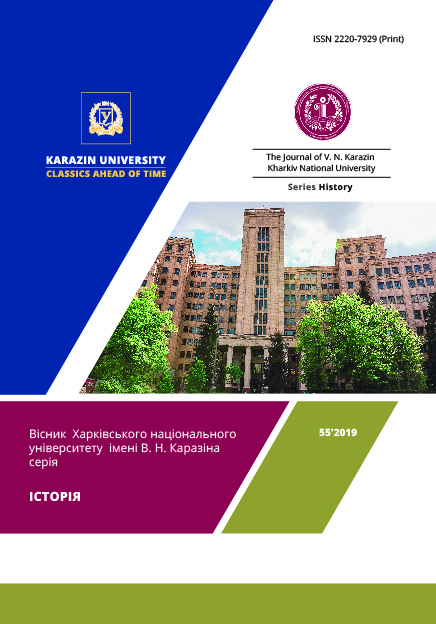AFL-CIO Against the AUCCTU: Struggle for Influence in Tradeunion Movement of Africa (the Late 1950th - 1960th)
Abstract
One of important episodes of cold war is considered in the article, when two leading trade-union centers of opposing parties (AFL-CIO and AUCCTU) developed a fight for influence and attraction on their side of trade union movement of the African countries. In this context the aim not to admit strengthening of the rival in the given region and to use the influence for advancement of foreign policy of their states was pursued. The expansion of the US trade union center in Africa began in the North African region, where the AFL-CIO supported national liberation movements in these countries, helped establish national trade union centers in Algeria, Tunisia, and Morocco; the reasons for the deterioration of their relationship with the AFL-CIO in the future are considered. There are analyzed the methods used by AFL-CIO and the AUCCTU to attract African unions to their side, and the policy of balancing African labor leaders in these conditions. The changes in the policies of the Soviet and American trade union centers after 1960 (“Year of Africa”), when immediately 17 African states became independent, are analyzed. After that, the AFL-CIO and the AUCCTU identified for themselves priority countries in Africa, which are becoming a kind of «bridgeheads», «strongholds» for the development of their activities on the continent. For the AUCCTU this is Guinea; for the AFL-CIO – Kenya. It was found out how it happened that the AUCCTU actually lost its «bridgehead». The history of the confrontation between the trade union centers of the two superpowers for the influence in the trade union movement of Kenya, which became the stronghold of the AFL-CIO in Africa, is examined. The author concludes that the balance of power following the results of the struggle between the AFL-CIO and the AUCCTU for influence in Africa by the end of the 1960s evolved not in favor of the latter.
Downloads
References
Государственный архив Российской Федерации (ГАРФ).
Пегушев А. М. Кения. Очерк политической истории (1956—1969) / А. М. Пегушев. – М., 1972. – 272 с.
Мирский Г. И. «Третий мир»: общество, власть, армия / Г. И. Мирский. – М., 1976. – 408 с.
Российский государственный архив новейшей истории (РГАНИ).
Эттвуд У. Красные и черные. Личные впечатления / У. Эттвуд. – М., 1968. – Вып. 1. – 183 с.
AFL-CIO Executive Council Statements and Reports, 1956-195. – V. 2. – (1960- 1963). – Westport (Conn.); London, 1977. – pp. 553-1120.
Bülow Mathilde von. Irving Brown and ICFTU Labor Diplomacy During Algeria’s Struggle for Independence, 1954-1962 / In: American Labor’s Global Ambassadors: The International History of the AFL-CIO during the Cold War [Text] / Mathilde von Bülow. – New York, 2013.
Carew A. Conflict Within the ICFTU: Anti-Communism and Anti-Colonialism in the 1950s // International Review of Social History / A. Carew. – Vol. 41. – Issue 2. – August 1996. – pp. 147-181.
Conde A. Guinée: Albanie del’Afrique ou Néo-colonie Américaine? / A. Conde. – Paris, 1972. – 270 p.
Goldsworthy, D. Tom Mboya: The man Kenia Wanted to Forget / D. Goldsworthy. – Nairobi; London; New York, 1982. – XII, 308 p.
Kaké I. B. Sékou Touré, le Héros et le Tyran / I. B. Kaké. – Paris, 1987. – 254 p.
Morgan T. A Covert Life: Jay Lovestone, Communist, Anti-Communist, and Spymaster / T. Morgan. – New York, Toronto, 1999. – 402 p.
Stoner John C. Anti-Communism, Anti-Colonialism, and African Labor: the AFL-CIO in Africa, 1955-1975 / J. C. Stoner. – Dissertation, 2001. – 678 p.
Copyright (c) 2019 Chernyavsky L. S.

This work is licensed under a Creative Commons Attribution 4.0 International License.
Authors who publish with this journal agree to the following terms:
- Authors retain copyright and grant the journal right of first publication with the work simultaneously licensed under a Creative Commons Attribution License that allows others to share the work with an acknowledgement of the work's authorship and initial publication in this journal.
- Authors are able to enter into separate, additional contractual arrangements for the non-exclusive distribution of the journal's published version of the work (e.g., post it to an institutional repository or publish it in a book), with an acknowledgement of its initial publication in this journal.
- Authors are permitted and encouraged to post their work online (e.g., in institutional repositories or on their website) prior to and during the submission process, as it can lead to productive exchanges, as well as earlier and greater citation of published work (See The Effect of Open Access).




